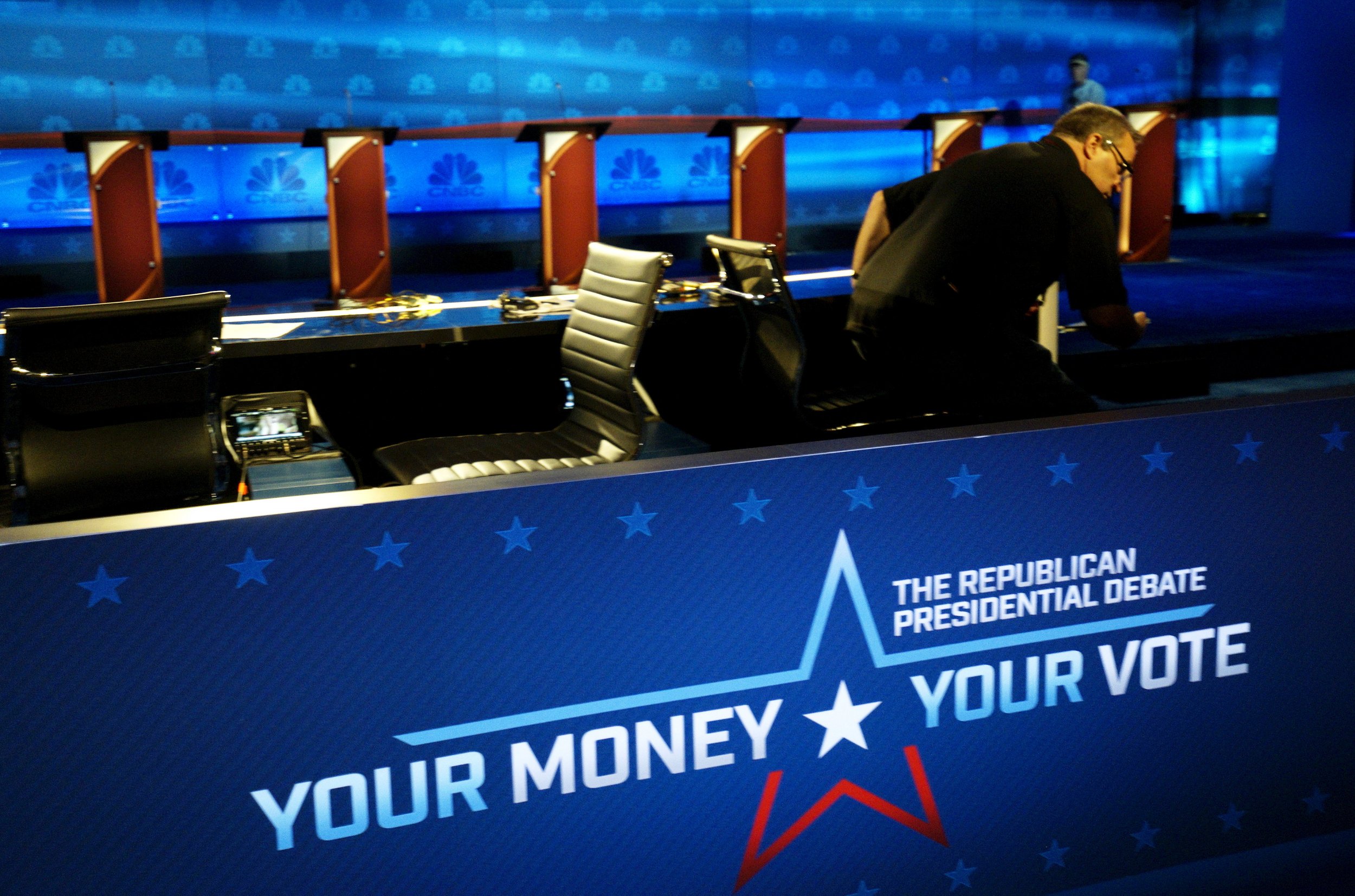
The Republican Party has traditionally been the party of business. In the modern era, its advocacy for lower taxes and fewer regulations have kept a steady supply of business donations flowing the party's way. A 2014 survey by the National Small Business Association found that more small business owners identify as Republicans than Democrats. Data from the Center for Responsive Politics, which tracks campaign donations, show that the financial services industry, for instance, gives more and more money to Republicans every year.
But, as of late, the love affair between the GOP and businesses big and small has begun to cool. The causes of the falling out are many: among them are the party's brinkmanship on shutting down the government; its refusal to raise the debt ceiling; and its hard-core stance against certain business-friendly programs that have long had bipartisan support, such as the Export-Import Bank, which finances and insures foreign goods. The third Republican presidential debate, hosted by business-centric CNBC Wednesday at 8 p.m. EDT, will likely feature questions that reveal these tensions.
Since they swept into office in 2010, Tea Party supporters in Congress have been willing to shut down the government and have threatened to refuse to raise the debt limit in order to get the budget cuts that they want. Government shutdowns hurt the economy, which is why businesses hate them: The 2013 shutdown, which lasted 16 days, cost the economy $24 billion, according to analysis by Standard & Poor's. Defaulting on the national debt could also be cataclysmic for the economy, but it came perilously close to happening in 2011, when the country teetered on the edge of default as the Tea Party torpedoed budget negotiations between John Boehner and the White House.
Business groups were furious about both events. On the debt ceiling, the U.S. Chamber of Commerce sent a letter to every member of Congress begging them to raise the debt ceiling, which would allow more government borrowing to pay past obligations.
In 2011, nearly 500 presidents and CEOs of companies big and small wrote to Congress and President Obama warning that raising the debt limit was crucial to the economy. And the Financial Services Forum warned that failure to raise the debt ceiling "would be catastrophic for financial markets." The 2013 shutdown left business leaders equally apoplectic after it put the kibosh on tourism to National Parks, delayed government loans, stymied drug approval and left businesses, big and small, furious.
There's some sign of a thaw, which would make the likelihood of these standoffs more remote. This week, Congress is expected to pass a budget deal that will avoid a shutdown for this year and raise the debt ceiling, avoiding a crisis on both fronts. That's the good news. The bad news is that it was largely done in secret and Tea Party Republicans are furious about it even as it will probably pass. Even likely incoming House Speaker Paul Ryan has condemned the way the deal was forged. At the same time, he has promised to end the GOP-controlled House from lurching from crisis to crisis. Whether he can or not remains to be seen.
Likewise, business has been outraged at the way some Republicans have held up reauthorization of the Export-Import Bank. The bank has had longstanding bipartisan support and its loans and loan guarantees have helped American companies sell goods abroad. But not anymore. Led by conservative Republicans, Congress did not extend EXIM's authority in 2015. Cruz called the bank "a classic example of corporate welfare" and "cronyism at its worst, with U.S. taxpayers guaranteeing billions of dollars in loans for sketchy buyers in foreign nations." But business groups strongly support the Ex-Im Bank and want Congress to extend its authority. The U.S. Chamber of Commerce calls the Bank "one of the most important tools at the disposal of U.S. companies to increase exports and create jobs" and decries Cruz's claim that the Bank provides 'corporate welfare' as "a myth."
On Monday, supporters of Ex-Im forced a vote on the Bank on the House floor. With the Bank back in the news, the GOP hopefuls are likely to be questioned about it at Wednesday night's debate.
Then there's the Trans-Pacific Partnership (TPP), a free-trade deal negotiated by the Obama administration and 11 other Pacific Rim countries. The largest deal of its kind ever negotiated, the TPP split the Republican Party. Business-friendly Republicans praised the deal for the access it would give American companies to foreign markets. The U.S. Chamber of Commerce, the largest business lobbying group in the U.S., praised the deal: "Completing the TPP would pay huge dividends for the United States. The agreement would significantly improve U.S. companies' access to the Asia-Pacific region, which is projected to import nearly $10 trillion worth of goods in 2020," it said in a press release. "The Trans-Pacific Partnership (TPP) is America's best chance to ensure the United States isn't stuck on the outside—looking in—as Asia-Pacific nations pursue new trade accords among themselves."
But the Tea Party lambasted the deal, both for the secrecy in which it was negotiated and as a way for U.S. companies to ship American jobs overseas. U.S. Senator Ted Cruz, a perennial favorite of Tea Party supporters, has been an opponent: In an op-ed for the conservative website Breitbart, Cruz wrote the deal "has become enmeshed in corrupt Washington backroom deal-making, along with serious concerns that it would open up the potential for sweeping changes in our laws that trade agreements typically do not include." Rand Paul, who has also had the backing of the Tea Party, has been critical of the deal, too. Donald Trump regularly labels it a "disaster." To be fair, most Democrats, from Hillary Clinton to Nancy Pelosi, oppose the deal, too, but business has come to expect Democrats to be more wary of free-trade deals. From business' perspective, it's the GOP that has betrayed them.
The tensions continue. Business has been overwhelmingly in support of comprehensive immigration reform. Former Michigan Governor John Engler, a Republican, has backed it. Facebook CEO and founder Mark Zuckerberg even formed a group to promote it. But, while a comprehensive immigration bill has cleared the Senate, it's dead on arrival in the House, where Tea Party–backed Republicans have more sway. House Speaker-in-waiting Paul Ryan has vowed not to press reform even though he supports it because he can't get his party on board. And Republican presidential front-runners Dr. Ben Carson and Donald Trump are famously opposed to a compromise that would allow some 11 million undocumented workers to have a pathway to legal residency or citizenship.
Finally, there's Common Core, the set of voluntary educational standards developed by business and the states. Jeb Bush supports it, but pretty much every other major Republican presidential candidate has savaged it, including some who once supported the reforms. Major business groups overwhelmingly supported the standards, but Donald Trump, the Tea Party and others say they undermine local control. Two years ago, more than 70 CEOs, including the heads of 3M, Boeing, Exxon-Mobil, General Mills, AT&T and Alcoa, signed a letter supporting Common Core. But there aren't seven Republican candidates who back it.
Uncommon Knowledge
Newsweek is committed to challenging conventional wisdom and finding connections in the search for common ground.
Newsweek is committed to challenging conventional wisdom and finding connections in the search for common ground.
About the writer
Taylor is a general assignment reporter for Newsweek where he writes about U.S. politics, crime and courts, religion, marijuana law, ... Read more
To read how Newsweek uses AI as a newsroom tool, Click here.





